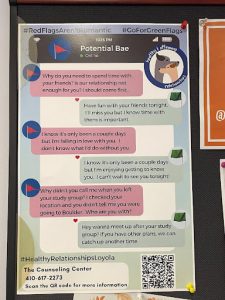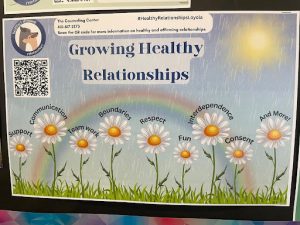The Counseling Center has officially released its yearly public health campaign: Healthy and Affirming Relationships. This campaign is a collaboration by the Counseling Center and several campus partners including the Women’s Center, Title IV, Residence Life & Housing, ALANA Services, and Student Engagement to educate and provide resources to the Loyola community. Dr. Ryan Sappington, a staff psychologist and public health committee member, says this public health campaign is for the whole Loyola community.
“The focus of the Counseling Center’s public health campaigns is to build and promote awareness. Helping the Loyola community, not just students, but faculty, staff, and administration learn about certain issues that relate to mental health,” Sappington said.
Two years after the pandemic, Sappington says its effects continue to linger as students across the United States struggle to connect and build relationships. He noted that the impact of prolonged social isolation and widespread grief and trauma have contributed to an atrophying of social skills and many’s ability to connect with others. Social media and ongoing global events such as war, genocide, and violence are also contributing to obstacles in our ability to connect with others.
Dr. Sappington says this public health campaign addresses relationship themes and patterns that have bubbled up in the Loyola community.
“I think we see a lot of themes and patterns emerging among today’s college student population. It feels harder to navigate relationships and handle conflict. The skills that go into having and building sustaining healthy relationships again have been a little dormant,” he said.

Students may experience a vast spectrum of relationship diversity throughout their lives like romantic/sexual, platonic, and professional relationships. This campaign also highlights healthy and unhealthy relationship behaviors that relate to setting boundaries, coercion, and consent. Additionally, the campaign includes intersectionality and identity, which focus on how we relate and connect to others.
“When we talk about mental health, we are oftentimes talking about connection, disconnection, and healthy or unhealthy relationship experiences throughout our lives. In addition to that, I think our staff has been noticing and being aware in recent years of ways in which our relationship experience as human beings have been impacted by a lot of things happening in the world,” he said.
College is a significant time in a person’s life as one tries to find who they are and how they relate to others. It is a pivotal time for college students to develop social skills that build healthy relationships.
“I think it is incredibly important for today’s college students, but also college students across generations to be really intentional when it comes to seeing college as an opportunity to grow relationally and interpersonally,” Sappington said.
He also mentioned the importance of intentional reflection on behaviors and patterns in our relationships that may be unhealthy. These may include being vigilant about our own feelings, boundary setting, and reactions. Social media can play a powerful role in how we view and show up in our relationships. Sappington says internalized messaging in the media can foster unhealthy behaviors that translate into our relationships.
“Norms around masculinity, especially men in heteronormative relationships, that men should be the ones in control. We need to be vigilant about internalizing that and how that can play out. I think we also need to be vigilant about how easy it is for any of us to look on social media and around us to see relationships amongst our peers that seem polished, perfect, and flawless, especially because of the depiction of relationships on social media,” he said.
To become an advocate of healthy relationships, the normalization of relationship conversations needs to be prioritized. Sappington said communication needs to be the norm to build and be an advocate for relationships.
“It should be normalized to say conversations about boundaries, respect, compassion, physical and sexual touch should be the norm, yet so often they aren’t. We are avoiding them and making assumptions and a lot of that comes from messages we’ve received, but we really need to start normalizing really honest, open, and vulnerable communication,” he said.
The Counseling Centers campaign is one starting point for learning to build healthy and affirmative relationships. Click here for more information on the Counseling Center’s campaign.







































































































